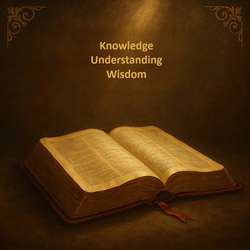
Knowledge, Understanding and Wisdom - What are they?
The Bible often uses the terms knowledge, understanding and wisdom together, particularly in books like Proverbs, but they each carry distinct meanings and roles.
1. Knowledge (Hebrew: Da'ath - דַּעַת)
Definition: Knowledge is the accumulation of facts, information, and truths. It is the foundation—knowing what is right and what is wrong according to God's law.
Biblical Perspective: Knowledge in the Bible often refers to knowing God, His commands, and His ways.
Key Aspect: Knowledge is about awareness and information.
Example: Proverbs 1:7 - The fear of the LORD is the beginning of knowledge, but fools despise wisdom and instruction
This verse implies that true knowledge starts with reverence for God.
In Practice: You can have knowledge of Scripture by reading and memorizing it, but without applying it, knowledge alone can lead to arrogance ( 1 Corinthians 8:1 - Knowledge puffs up, but love builds up. )
2. Understanding (Hebrew: Biynah - בִּינָה)
Definition: Understanding is the ability to comprehend the meaning of knowledge and see how it connects. It involves perceiving patterns, discerning truths, and grasping implications that are not immediately obvious.
Biblical Perspective: Understanding goes beyond knowing facts—it is about spiritual perception and maturity. It allows a person to distinguish between surface knowledge and deeper truths revealed through God's Spirit.
Key Aspect: Understanding is about discernment and comprehension.
Example: 1 Corinthians 13:11 - When I was a child, I spake as a child, I understood as a child, I thought as a child: but when I became a man, I put away childish things.
This verse reflects a progression from immature understanding to mature insight. Paul acknowledges that our understanding changes as we grow in faith—moving from a limited, childlike grasp of spiritual truth to a deeper, more mature comprehension as we develop in Christ.
In Practice: Understanding helps you interpret Scripture in context and recognize how biblical truths interrelate. For example, you may know (knowledge) the command to love your neighbor, but understanding allows you to discern how to love wisely in different situations—recognizing motives, needs, and the spiritual implications of your actions.
3. Wisdom (Hebrew: Chokmah - חָכְמָה)
Definition: Wisdom is the proper application of knowledge and understanding. It is knowing the right thing to do and doing it at the right time and in the right way.
Biblical Perspective: In the Bible, wisdom is often portrayed as a divine attribute and is closely tied to fearing and obeying God.
Key Aspect: Wisdom is about application and practice.
Example: Proverbs 9:10 - The fear of the LORD is the beginning of wisdom, and knowledge of the Holy One is understanding.
Wisdom begins when you reverently apply what you know and understand about God.
In Practice: Wisdom helps you live righteously. For example, you may know (knowledge) and understand (insight) that gossip causes harm, but wisdom leads you to guard your tongue and speak kindly instead.
How They Work Together:
A biblical example that clearly demonstrates how knowledge, understanding, and wisdom work together is found in the life of King Solomon:
Knowledge: Solomon knew God's laws and was taught by his father, David.
Understanding: When two women came to him disputing over a baby, he understood human nature and the emotions of a true mother. ( 1 Kings 3:16-28 )
Wisdom: He applied his understanding by suggesting the baby be divided, which revealed the real mother through her selfless response.
A Simple Analogy:
Knowledge is knowing that a tomato is a fruit.
Understanding is knowing that a tomato doesn't belong in a fruit salad.
Wisdom is choosing to cook a delicious sauce with it instead.
Practical Application for Proverbs 31:3 Context:
In Proverbs 31:3 ( Do not give your strength to women, nor your ways to that which destroys kings ), knowledge, understanding, and wisdom can be seen as follows:
Knowledge: Knowing the dangers of immoral relationships and their consequences.
Understanding: Realizing how such relationships have destroyed leaders (e.g., Samson, Solomon) and seeing the spiritual and personal cost.
Wisdom: Choosing to remain faithful and pursue godly relationships.
Conclusion:
Knowledge is information from God's Word.
Understanding is insight into the meaning of that information.
Wisdom is application—living it out in daily life.